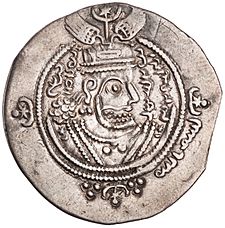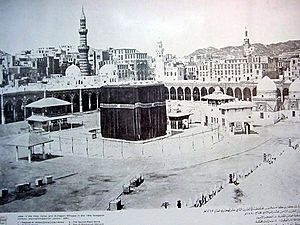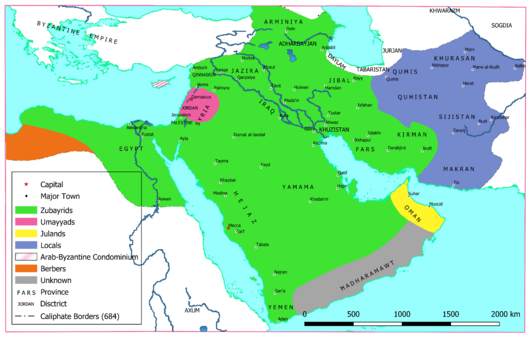Abd Allah ibn al-Zubayr facts for kids
Quick facts for kids Abd Allah ibn al-Zubayrعبد الله ابن الزبير |
|||||
|---|---|---|---|---|---|

|
|||||
| Caliph (disputed) | |||||
| Reign | 683–692 | ||||
| Predecessor | Yazīd I | ||||
| Successor | ʿAbd al-Malik | ||||
| Born | May 624 CE Medina, Hejaz, Arabia |
||||
| Died | October/November 692 CE (aged 68) Mecca, Hejaz |
||||
| Burial | Jannat al-Mu'alla, Mecca | ||||
| Spouse |
|
||||
| Issue |
|
||||
|
|||||
| Tribe | Quraysh (Banū Asad) | ||||
| Father | al-Zubayr ibn al-ʿAwwām | ||||
| Mother | Asmā' bint Abī Bakr | ||||
| Religion | Islam | ||||
Abd Allah ibn al-Zubayr (Arabic: عبد الله ابن الزبير ابن العوام, romanized: ʿAbd Allāh ibn al-Zubayr ibn al-ʿAwwām; born May 624 CE, died October/November 692 CE) was an important leader in early Islamic history. He led a rival government based in Mecca against the Umayyad rulers from 683 until his death.
Abd Allah was the son of al-Zubayr ibn al-Awwam and Asma bint Abi Bakr. His family, the Quraysh, was a powerful tribe in the early Muslim community. He was also the first child born to the Muhajirun, who were the first people to convert to Islam and move from Mecca to Medina.
As a young man, Abd Allah took part in early Muslim military campaigns. He fought alongside his father in Syria and Egypt. He also helped in the Muslim conquests of North Africa and northern Iran. During the First Fitna (the first Muslim civil war), he supported his aunt A'isha against Caliph Ali (r. 656 – 661).
Later, Abd Allah opposed the first Umayyad caliph, Mu'awiya I (r. 661 – 680). He especially disliked Mu'awiya's decision to name his son, Yazid I, as his successor. Abd Allah and many other important Muslim leaders in the Hejaz (western Arabia) believed that the caliphate should not be passed down like a family inheritance.
Abd Allah set up his base in Mecca and gathered people who opposed Yazid (r. 680 – 683). After Yazid died in 683, Abd Allah declared himself caliph. This started the Second Fitna (the second Muslim civil war). After Yazid's son and successor died quickly, the Umayyad government lost control in many areas. Most provinces then accepted Abd Allah as their leader.
However, his power was mostly limited to the Hejaz. By 685, the Umayyad Caliphate was rebuilt under Marwan I in Syria and Egypt. Abd Allah's power was also challenged in Iraq and Arabia by other groups. His brother Mus'ab helped him regain control in Iraq by 687. But Mus'ab was defeated and killed by the Umayyad caliph Abd al-Malik in 691. Finally, the Umayyad commander al-Hajjaj ibn Yusuf attacked Abd Allah in Mecca. Abd Allah was killed there in 692.
Abd Allah was able to lead many unhappy Muslim groups because of his strong family ties to the Islamic prophet Muhammad. He also had a special connection to the holy city of Mecca. He wanted to make the Hejaz the main political center again. But he refused to leave Mecca, which made it hard for him to control other provinces. He relied on his brother Mus'ab and other loyal people, who often ruled on their own. So, Abd Allah played a smaller role in the actual fighting that happened in his name.
Contents
Early Life and Family Connections
Abd Allah ibn al-Zubayr was born in Medina in western Arabia in May 624 CE. He was the oldest son of al-Zubayr ibn al-Awwam, a close friend of Muhammad and an important Muslim figure. His family belonged to the Banu Asad clan, which was part of the powerful Quraysh tribe of Mecca. Mecca was a major trade city and home to the Ka'aba, the holiest place in Islam.
Abd Allah's grandmother was Safiyya bint Abd al-Muttalib, who was Muhammad's aunt. His mother, Asma, was the daughter of the first caliph, Abu Bakr (r. 632 – 634). She was also the sister of A'isha, one of Muhammad's wives. Historians say Abd Allah was the first child born to the Muhajirun, who were the first Muslims to move from Mecca to Medina. These family and religious connections made Abd Allah very respected as an adult.
Abd Allah had several wives and children. His first wife, Tumadir bint Manzur, gave birth to his oldest son, Khubayb. This is why Abd Allah was known as "Abu Khubayb" (meaning "father of Khubayb"). He also had other sons like Hamza, Abbad, al-Zubayr, and Thabit.
Military Actions
Abd Allah ibn al-Zubayr was involved in military campaigns from a young age. In 636, during the rule of Caliph Umar, he might have been with his father at the Battle of Yarmouk against the Byzantines in Syria. He was also with his father during the campaign against Byzantine Egypt in 640.
In 647, Abd Allah showed great bravery in the Muslim conquest of Ifriqiyah (North Africa). He found a weak spot in the Byzantine army's lines and killed their leader, Gregory. Caliph Uthman praised him for this. Later, in 650, he joined a campaign in northern Iran.
Uthman also asked Abd Allah to help with the official version of the Qur'an. When rebels surrounded Uthman's house in 656, Abd Allah was in charge of defending him. He was reportedly injured in the fighting. After Uthman was killed, Abd Allah fought alongside his father and aunt A'isha against Caliph Ali's supporters at the Battle of the Camel in December. Abd Allah was wounded in this battle. After Ali won, Abd Allah returned to Medina.
Revolt Against the Umayyads
Opposing Umayyad Rule

Abd Allah ibn al-Zubayr did not oppose Mu'awiya I becoming caliph in 661. But he refused to accept Mu'awiya's decision to name his son, Yazid I, as the next caliph in 676. When Yazid became caliph in 680, Abd Allah again said he was not a rightful ruler. Yazid had the support of the Syrian Arab tribes, who were the main part of the Umayyad army.
Yazid ordered the governor of Medina to make Abd Allah submit. But Abd Allah managed to escape to Mecca. Husayn, Ali's son, also refused to accept Yazid and joined Abd Allah in Mecca. Husayn and his followers later fought the Umayyads in Karbala in 680, where Husayn was killed.
After Husayn's death, Abd Allah secretly started gathering supporters. By September 683, he had taken control of Mecca. He called himself al-ʿaʾidh biʾl bayt (the one seeking refuge at the Ka'aba). He also used the slogan lā ḥukma illā li-ʾllāh (judgment belongs to God alone). He did not immediately claim to be caliph himself.
Yazid sent an army from Syria, led by Muslim ibn Uqba, to stop Abd Allah and his supporters. The Medinan supporters were defeated at the Battle of al-Harrah in 683. The army then moved towards Mecca. The new commander, Husayn ibn Numayr al-Sakuni, attacked Mecca on September 24. Abd Allah refused to surrender. The Ka'aba was badly damaged during the attack. In November, news arrived that Yazid had died. This led al-Sakuni to talk with Abd Allah. Al-Sakuni offered to recognize Abd Allah as caliph if he would rule from Syria. Abd Allah refused, and the army left for Syria, leaving him in control of Mecca.
Becoming Caliph

Yazid's death and the Umayyad army's retreat gave Abd Allah the chance to become caliph. He immediately declared himself Amir al-Mu'minin (commander of the faithful), a title for the caliph. He asked all Muslims to pledge their loyalty to him. With other potential leaders in the Hejaz gone, Abd Allah became the main choice for caliph among those who opposed the Umayyads. Most groups recognized him as their leader.
However, the Banu Hashim clan, to which Muhammad and the Alids belonged, did not immediately support him. Their leaders, Muhammad ibn al-Hanafiyyah and Abd Allah ibn Abbas, wanted more widespread agreement in the Muslim community. Annoyed, Abd Allah surrounded their neighborhood in Mecca and imprisoned Ibn al-Hanafiyya to pressure them. Meanwhile, the Kharijites in central Arabia stopped supporting Abd Allah when he claimed the caliphate, as they did not believe in the institution of the caliphate.
In the Umayyad capital, Damascus, Yazid's young son Mu'awiya II became caliph but had little power. He died after only a few months. This created a power vacuum in Syria. Umayyad authority collapsed across the caliphate, and Abd Allah gained wide recognition. Most Islamic provinces, including Egypt, Kufa, Yemen, and parts of Syria, pledged loyalty to him. Coins were even minted in his name in distant areas like Iran. However, his power outside the Hejaz was mostly just on paper.
The Arab tribes in central and southern Syria remained loyal to the Umayyads. They chose Marwan I to be the new caliph in Damascus. This was a turning point for Abd Allah. Marwan's supporters defeated Abd Allah's allies at the Battle of Marj Rahit in July 684. In March 685, Abd Allah also lost control of Egypt to Marwan.
Abd Allah's talks with al-Mukhtar al-Thaqafi, a powerful leader in Kufa, failed. Al-Mukhtar then supported the Alid family and declared Ibn al-Hanafiyya as caliph. Al-Mukhtar's followers drove out Abd Allah's officials from Kufa in October 685. Al-Mukhtar later sent a force to Mecca and freed Ibn al-Hanafiyya. Abd Allah's brother Mus'ab managed to regain control in Basra and Khurasan. Mus'ab defeated and killed al-Mukhtar in April 687.
Abd Allah then removed Mus'ab from his position and appointed his own son, Hamza, as governor of Basra. Hamza was not good at managing Iraq, and he was later replaced by Mus'ab again. By this time, the Kharijites had taken over Yemen and other parts of Arabia.
Defeat and Death
After al-Mukhtar's defeat, Abd Allah and Abd al-Malik (r. 685–705), Marwan's son and successor, became the two main contenders for the caliphate. However, the Kharijites' gains in Arabia cut off Abd Allah in the Hejaz from his supporters elsewhere. In 691, Abd al-Malik gained the support of important tribes, clearing the way for his Syrian army to attack Iraq. Later that year, Abd al-Malik's forces conquered Iraq and killed Mus'ab in battle.
Abd al-Malik then sent his commander, al-Hajjaj ibn Yusuf, to defeat Abd Allah. Al-Hajjaj attacked and bombarded Mecca for six months. Most of Abd Allah's supporters and his sons surrendered after being offered pardons. But Abd Allah remained determined. Following his mother's advice, he went into battle and was killed on October 3 or November 4, 692.
A historian from the 9th century, al-Tabari, tells a story that when al-Hajjaj and his officer stood over Abd Allah's body, the officer said, "No woman has given birth to a man braver than him... He had no defenses, no fortress, no stronghold; yet he fought us as an equal." Al-Hajjaj displayed Abd Allah's body publicly until Abd al-Malik allowed his mother to take it. Abd Allah was buried in his grandmother's house in Medina. The Umayyad victory and Abd Allah's death marked the end of the Second Fitna.
Later Generations
After his victory, Abd al-Malik took control of Abd Allah's properties in Medina and other places. However, the caliph later returned some of these properties to Abd Allah's sons. His oldest son, Khubayb, was whipped to death in Medina during the rule of Caliph al-Walid I (r. 705–715). Another son, Thabit, gained favor with Caliph Sulayman ibn Abd al-Malik (r. 715–717), who agreed to return the rest of the seized properties to Abd Allah's sons.
Later, under the Abbasid caliphs al-Mahdi (r. 775–785) and Harun al-Rashid (r. 786–809), some of Abd Allah's descendants held important government jobs. For example, his great-grandson Abd Allah ibn Mus'ab and his son Bakkar ibn Abd Allah both served as governors of Medina.
What People Thought of Abd Allah
Abd Allah ibn al-Zubayr strongly believed that the caliphate should not be passed down only within the Umayyad family. He thought the caliph should be chosen by shura (consultation) among all the Quraysh tribe. The Quraysh did not like the Umayyads having all the power and wanted it shared among all Qurayshi clans.
However, Abd Allah did not create any new religious ideas or political plans, unlike the Alid and Kharijite groups at the time. When he claimed the caliphate, he became the leader of the unhappy Quraysh. Historian H. A. R. Gibb said that Abd Allah was a key figure for the second generation of important Muslim families in the Hejaz who felt left out by the ruling Umayyad family.
Even though Gibb described Abd Allah as "brave, but selfish," many traditional Muslim sources describe him as a "model of piety" because of the dislike for the Umayyads. Still, some Muslim sources criticized him for being jealous and harsh, especially for how he treated his brother 'Amr and for imprisoning Muhammad ibn al-Hanafiyya.
Abd Allah gathered support against the Umayyads from his base in Mecca, Islam's holiest city. His strong connection to Muhammad and his family also gave him great respect. He wanted to bring back the Hejaz as the political center. After Uthman was killed, the center of power had moved first to Kufa and then to Damascus. Abd Allah strongly connected himself with Mecca and its Ka'aba. This, along with his control of Medina, Islam's second holiest city, gave his caliphate a holy feeling.
Abd Allah refused an offer of support from the Syrian army partly because it would have meant moving to Damascus. He chose to stay in Mecca, from where he sent orders to his supporters. This limited his direct power in larger provinces like Iraq, where his brother Mus'ab ruled almost independently. In Arabia, Abd Allah's power was mostly limited to the Hejaz, while the Kharijite leader Najda had more influence in most of the peninsula. So, Abd Allah became more of a background figure in the movement that was started in his name.
During his rule, Abd Allah made big changes to the Ka'aba's structure. He said these changes followed Muhammad's teachings. He called himself the "fugitive at the sanctuary [Ka'aba]," while his Umayyad enemies called him "the evil-doer at Mecca."
Timeline of the Two Caliphates
Three Umayyad caliphs ruled during the twelve years of Abd Allah ibn al-Zubayr's caliphate (680–692). The short periods in light blue and yellow show the times of Mu'awiya II and Marwan I.


See also
 In Spanish: Abd Allah ibn al-Zubayr para niños
In Spanish: Abd Allah ibn al-Zubayr para niños
- Zubayrids
- Urwah ibn Zubayr
- Hisham ibn Urwah
- Fatima bint Mundhir
 | John T. Biggers |
 | Thomas Blackshear |
 | Mark Bradford |
 | Beverly Buchanan |

